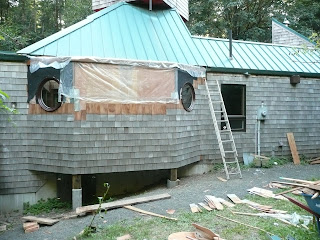 “I try hard to keep my writing alive while I’m teaching, but I typically end up without a lot of juice by the end of the term. The prospect of a week at Soapstone gave me a huge lift during those busy weeks when I wasn’t finding energy for much of my own writing–I thought about it every day all fall, looking forward to feeding my need for solitude and creative renewal. I was aware, too, having spent time on retreat in the past, that there’s a danger in pinning one’s hopes and expectations on a particular outcome.
“I try hard to keep my writing alive while I’m teaching, but I typically end up without a lot of juice by the end of the term. The prospect of a week at Soapstone gave me a huge lift during those busy weeks when I wasn’t finding energy for much of my own writing–I thought about it every day all fall, looking forward to feeding my need for solitude and creative renewal. I was aware, too, having spent time on retreat in the past, that there’s a danger in pinning one’s hopes and expectations on a particular outcome.“I was careful not to have any lofty goals for the week–I told myself I just wanted to read and write and walk–but what I forgot to factor in when I pictured being there was my exhaustion. When I finally arrived there was a big brain-dead part of me that frankly didn’t want to read and write at all. If I’d been home I probably would have watched a lot of movies and baked a lot of cookies. But the truth is, I would have been avoiding writing not just because I was tired but because it can be damn hard to start up after a dry spell. The enormous value of being at Soapstone for me was that I stuck with myself and kept writing.
“I spent a lot of time just watching the creek. The water was clear with ice on the fringes for the first several days. Every so often a piece would break off and float serenely away. Details of the surroundings began appearing in my writing immediately–the changing sounds of the creek, the ticking of the wood stove, the stirring of the wind in the alder branches. After a few days it began to rain–hard–and the creek was soon hurtling downstream at a frenetic rate. Being next to moving water made me very aware of my own pulsing circulating blood and the flow of energies and emotions and thoughts. When the writing felt most satisfying, I was responding effortlessly to that flow without trying to move it in a certain direction. But the days felt expansive enough to apply myself in many different ways; I did some very focused revision as well.
 “I’m amazed at all the careful thought that’s been put into making this refuge for women writers, and I’m forever grateful for the chance to spend time there.”
“I’m amazed at all the careful thought that’s been put into making this refuge for women writers, and I’m forever grateful for the chance to spend time there.”Jessica Lamb has taught writing for many years through the Northwest Writing Institute, Portland Community College, and the Literary Arts Writers in the Schools program. Her poems have appeared in numerous journals, including Poetry, The Southern Review, and Willow Springs. Her first book of poems, Last Apples of Late Empires, was published in the spring of 2009 by Airlie Press, an Oregon publishing collective of which she is a founding member.
RUTH GUNDLE






















